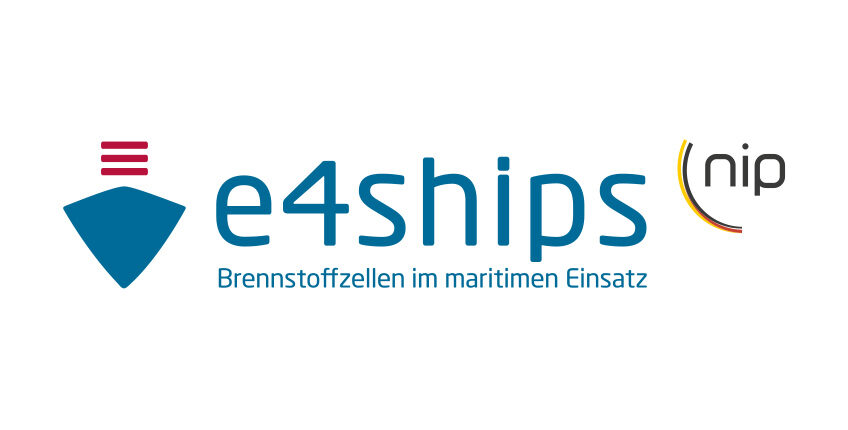There have always been innovations in shipping. But the scale of the transformation process that has now begun towards the broad decarbonization of shipping is raising the bar entirely. Green hydrogen, its derivatives processed to e-fuels and PtX fuels, and the fuel cell systems they power on ships, are the focus of today’s international trade fair for the shipping industry, SMM. The maritime industry and innovation cluster e4ships will report on application concepts, scientific findings and application experiences at this event.
Given the worsening climate and energy crises, the global shipping industry is facing the huge challenge of best positioning itself for the incipient technological transformation process. The focus is on bringing the relevant technologies and application concepts for various energy sources to the point of application maturity and at the same time, developing the safety regulations for the licensing and operation of ships with innovative energy converters and alternative fuels. This is needed because a broad industrial implementation requires uniform international technical standards that facilitate rapid and standardized certification without prototypical individual licensing.
With the large-scale project e4ships – fuel cells in maritime application, Germany has made significant progress on its course towards sustainable shipping. In cooperation with fuel cell manufacturers, leading German shipyards and shipping companies have focused on developing fuel cell systems for the specific needs of maritime and inland waterway shipping early on in the Pa-X-ell2, ELEKTRA, MultiSchIBZ and RiverCell2 demonstration projects. At the same time, the technical findings gained from these projects were actively incorporated into developing the safety regulations of the international shipping organisations, IMO and CESNI, for licensing ships with fuel cells on board.
In April 2022, the Maritime Safety Committee adopted the interim guidelines for the safety of ships using fuel cell power installations. These regulate the framework conditions for installing fuel cell energy systems in commercial shipping in order to make emission-free shipping a reality by means of efficient energy converters and climate-neutral fuels, and thus facilitate a successful market ramp-up of fuel cell systems in the maritime sector.
Among other factors, the findings of the e4ships partners and funding through the National Innovation Programme for Hydrogen and Fuel Cell Technology (NIP) have made a significant contribution to his.
NIP is coordinated by NOW GmbH and is implemented by Project Management Jülich (PtJ). Further information on the demonstration projects and the e4ships innovation cluster can be found in the latest brochure at the following link.
The following people made remarks at the e4ships & Zero Emission Shipping Symposium:
- Bingbing Song, Technical Officer at the International Maritime Organization (IMO)
- Susanne Henckel, State Secretary in the Federal Ministry for Digital and Transport (BDMV)
- Hermann Josef Mammes, Head of R&D Department at Meyer Werft
- Ralf Sören Marquardt, Director of the German Shipbuilding and Ocean Industries Association (Verbands für Schiffbau und Meerestechnik (VSM))
- Kurt-Christoph von Knobelsdorff, Managing Director (Chair) of NOW GmbH National Organisation Hydrogen and Fuel Cell Technology
Bingbing Song, Technical Officer at the International Maritime Organization (IMO): “The fight against climate change is one of the top priorities of the IMO. It is also one of the greatest challenges however, especially for shipping. To lead the industry into a low-emission or zero-emission future, we need safe technologies and fuels and the relevant innovations. The safe use of alternative marine fuels is an important step for the sector to reduce air pollution by ships, particularly also for protecting the health of residents in port cities. Promising solutions have been developed that chart a course to achieving the greenhouse gas reduction targets of the IMO’s interim greenhouse gas strategy. The IMO Sub-committee on Carriage of Cargoes and Containers (CCC) is currently ramping up its activities under the work plan for LPG, low flashpoint fuels, hydrogen and ammonia and is working on feasible solutions for ensuring threshold value compliance for sulphur oxide (SOx), nitrogen oxide (NOx) and CO2 as well as the careful clarification of safety issues and potential risks associated with using such fuels.”
Susanne Henckel, State Secretary in the Federal Ministry for Digital and Transport (BDMV): “The e4ships demonstration projects are outstanding lighthouse projects and a blueprint for climate- and environmentally-friendly shipping. The ELEKTRA for example, is already a model for other new ship builds and therefore already a huge success for the funding strategy of our ministry. With service lives of 50 years or more, such incentives are enormously important for accelerating the switch to climate-friendly propulsion systems in shipping. The projects are true pioneers not just in terms of technology, but also in terms of regulation. They pave the way here too, for the climate-neutral shipping of tomorrow.”
Hermann-Josef Mammes, Head of Department, Research and Development (RD) at Meyer Werft: “The introduction and integration of fuel cells in ships is not possible without demonstration projects. Both ongoing and completed projects represent the first steps on this path. Additional high-performance ship installations are needed so that this innovative fuel cell technology can be used in the shipping sector.”
Dr. Ralf Sören Marquardt, Director of the German Shipbuilding and Ocean Industries Association (VSM): “I am convinced that the German maritime industry will transform technological leadership into sales and employment.“
Kurt-Christoph von Knobelsdorff, Managing Director (Chair) of the National Organisation Hydrogen and Fuel Cell Technology (NOW): “We at NOW are convinced that the demonstration projects for fuel cells for maritime application and the accompanying innovation cluster, e4ships, are forging the path towards the market entry of fuel cell technology. Switching to climate-friendly shipping can only succeed if the question of drive systems is answered together with the fuel issue. Only with a holistic political strategy can the energy transformation in shipping be realized and technological advances, such as those achieved by e4ships with fuel cells, be secured. The further development of the innovation cluster involving stakeholders along the entire e-fuel supply chain for fuel cells for maritime use is a necessary step towards this and we look forward to accompany this move.”
More information: www.e4ships.de


